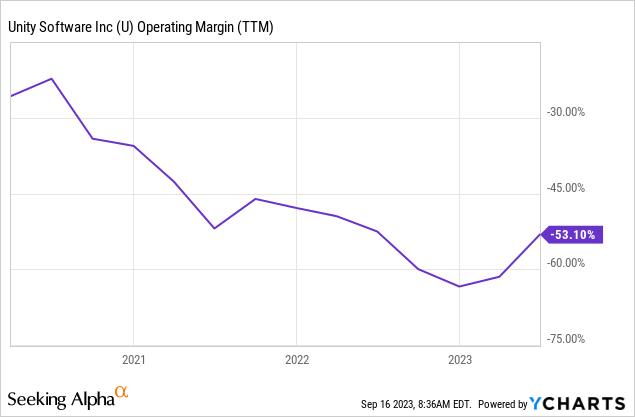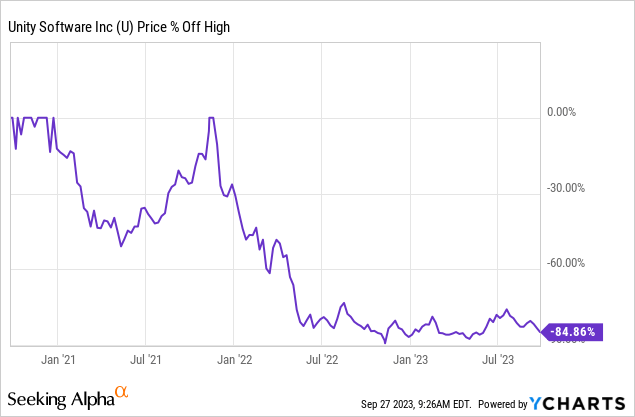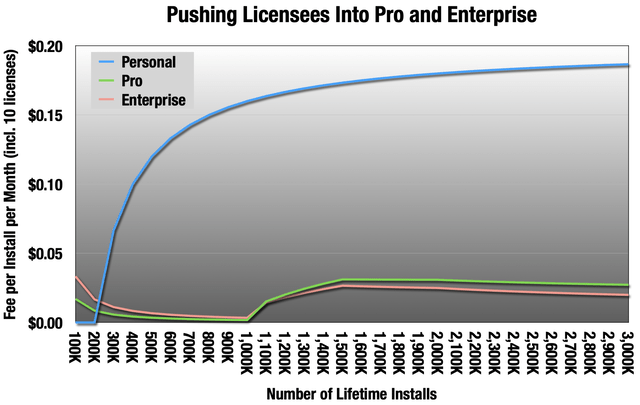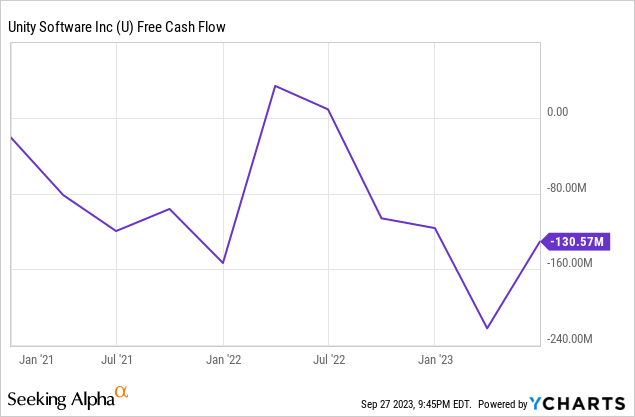Summary:
- Unity faces backlash from indie developers over changes to their pricing structure after undercharging for years, and creating expectations that it would always be that way.
- Raising prices is never easy, but it is also not this hard. This was one of the worst failures of corporate communications I have ever seen.
- They need to repair their relationship with developers and also fix their pricing issue. These goals are now at odds with each other.
- I believe this is a fireable offense for CEO John Riccitiello. I do not say this lightly.
Sundry Photography
Trust arrives on foot and leaves on horseback. (Vertrouwen komt te voet en gaat te paard).
-Dutch proverb.
I know that comes with how hard it is to earn trust, and I know how easy it is to lose trust.
– Marc Whitten, President, Unity Create.
What We’ve Got Here Is A Failure to Communicate
Unity (NYSE:U) is in a pickle. Let’s start here:

These sorts of things were ignored by investors in a low-rate environment, but that environment is gone, and so too are the investors.

They are facing the same issue we see in many software companies that started up during the low-rate environment. Investors told them they wanted growth, not profits. This is generally achieved through underpricing, which the VCs of Silicon Valley rebranded as “hacking growth”. Profits could come at some unspecified later date. That date has arrived.
Unity makes game/metaverse design tools and middleware, like their main competitor, Epic’s Unreal Engine. Gaming studios design their games with these tools, and in the final product the middleware handles all the graphics and sound for the game. The game cannot run without that middleware, and it also makes cross-platform development easier. It’s a great way for indie game studios to jumpstart game development, and reduce the upfront costs. For reference, on Steam, for games that use a middleware engine like Unity, Unity is 60% of them, Unreal 16%, and the rest spread among 83 others, including open source Godot.
They became dominant like that through their very agreeable terms. In the growth-at-all-costs stage that ended last year, Unity badly underpriced their software. For a while, they were offering perpetual licenses for $1500. They promised over and over to never charge royalties like Unreal does, 5% of game revenue.
Two weeks ago they announced they would be charging royalties once a game hit certain install and revenue thresholds – a per-install fee. For studios with games on subscription services like Xbox Game Pass, the per-install structure is a nightmare. The math for streaming games was even scarier. The math for free-to-play mobile games was even scarier.
So the indie developers are very angry, because they think this was a rug pull, and it was, given years of Unity’s communications and their old terms of service. Unity put themselves in a difficult position by undercharging for so long, and creating expectations that it would always be that way.
They made it much worse by the way they rolled it out, in a now frequently updated blog post.
This was one of the worst corporate communications failures I have ever seen. The developers immediately latched onto the “$0.20 per install per month” that headlined the original blog post. No one would have paid that.
This assumes a medium-sized game studio with 10 game developers, and also that each install generates at least $1 of revenue on average up to the first million. Also assumes the installs are all in the developed world, where the fees were much higher than in EMs. (Unity blog post and analyst calculations)
The new incentive structure they tried to implement:
- Use the free Personal license up to 200k installs and $200k revenue.
- Switch to the Pro license from 200k-1000k installs and $200k-$1000k revenue. This is a new annual cost of about $20k for all 10 developers at our hypothetical studio.
- Get the Enterprise license for a million or more installs and dollars. This is an additional annual cost of about $20k.
In total, our hypothetical 10-seat game studio would have paid Unity $60k a month for 3 million developed-world game installs, or $0.02 per install per month, not $0.20, which is what they let everyone think because of their failure at corporate communications. That includes the license cost. If the studio switched licenses at the right times, no studio this size or smaller would have ever paid more than $0.027 per install per month. Almost every article I’ve seen written by a developer said $0.20.
Unity also wanted to boost their add-on services for ads and audience engagement, where they compete with AppLovin (APP). Studios would get fee credits for using these.
For comparison, Unreal Engine just takes a straight 5% royalty on revenue. This is simple, intuitive, and does not require parsing language in the new terms of service, and making a complicated spreadsheet. It took me most of a Saturday morning to make that last chart. The opaque structure and lack of detail in the blog post allowed developers’ worst fears to fill in the gaps.
The most baffling part of this is that they have their developer in-person convention in November, and chose to drop this in a poorly written blog post in September instead of waiting until they could look people in the eye and be honest with them:
- Hey, I know you got your own problems, but look at our public financials. We lose a ton of money every year, and that’s not sustainable for anyone in this room. We rise or fall together.
- To become profitable, we need more money from successful games. There’s no way around that.
- Here’s our pitch, but we are open to suggestions, and we probably didn’t think of everything (they clearly didn’t). This is the beginning of a dialog with developers.
- This does not change anything for anyone already with a game out or in development. Keep developing under your current license terms.
Too late for that. The whole developer community is on the warpath, even people who don’t use Unity. I didn’t even try to disabuse developers I know of the notion that Unity wanted to charge $0.20 per install per month, not a figure that is about 90% less than that. The emotions are too hot.
On top of all this, Unity’s terms of service are a mess, and it’s not entirely clear that they could have even done this legally.
Raising prices is never easy, but it is also not this hard.
Backing Off
In the face of fierce resistance, Unity backed off almost everything, and even gave some stuff away to the free tier. Now only games over $1 million and a million installs will get the fee, and the terms now only apply to new games that start in 2024 and beyond. It will be the lesser of a per-install fee or a 2.5% royalty. What they continually failed to communicate is that the per-install fee will likely be less than the straight royalty for almost every game.
But it is too late; they have poisoned the well with their customers. I found this quote in the apology tour to be quite stunning:
One of the most, I think, really key pieces of feedback we heard is that it was a really big business model change that people didn’t expect.
– Marc Whitten, President, Unity Create
This tells me two things:
- They have little understanding of game studio business models. They sort of went into this thinking everyone was pay-to-play, when the game industry has been much more varied than that for years.
- They spent little or no time talking to anyone affected by this before they announced the change.
Who was responsible?
Well, listen, this is my part of the business and there’s a lot of people, obviously, internally that have worked on this. The executive team has worked on this, but I’m responsible for what we’re doing inside of Create.
– Marc Whitten, President, Unity Create
The person responsible for everything is the CEO, John Riccitiello. The original blog post was unsigned, from “Unity”. Since then, he has let Marc Whitten be the face of this. Whitten is responsible for the development tools and middleware, not how much they cost. Whitten is a product guy, previously Chief Product Officer for Xbox (MSFT) and then Sonos (SONO). He just wants to ship great software. The CEO is nowhere to be seen, and Whitten is the one who has to stand up to withering questions from customers and reporters, damaging his own standing. A good leader shares the praise when things are going well, and takes the blows when they are not.
I’ve written 895 articles at Seeking Alpha before this one, and I’ve never said this before in one of them: this is a fireable offense in my opinion, and I don’t say that lightly. They have alienated their customers and lost the trust that took years to build. The chatter I am hearing from developers and publishers is that they no longer trust Unity, or any commercial middleware. This was a sudden change to terms that seemed to come out of nowhere, and even though it has mostly been reversed, everyone is now worried about being reliant on a company with terrible financials, and under pressure from Wall Street. I am seeing a huge movement towards free open source software, access to which isn’t dependent on what the Fed Funds rate is at the moment.
Riccitiello has alienated his customers, and still not solved the pricing problem, which is where we began 1400 words ago.
Unity has a business model that became common in software companies during the last decade: growth at all costs. Gain scale, then become profitable, instead of gaining scale by becoming profitable. This only works in a permissive low-rate environment, and that environment is gone, at least for now.
What’s left in the new environment is a lot of broken business models. These companies have gotten away with underpricing largely by subjecting shareholders to quarterly dilutions of their holdings via share-based compensation. In the TTM, 24% of Unity’s expenses (cost-of-revenue plus Opex), was share-based compensation, $659 million. Even though they are billing shareholders directly for a large portion of payroll, they still had negative free cash flow. In fact, they usually do.

What is needed is a fresh start with developers, and someone who can right the financial ship without destroying it. These goals are now at odds with each other as the result of this horrible failure of corporate communications. I have lost confidence that current management can fix things.
Analyst’s Disclosure: I/we have a beneficial long position in the shares of MSFT either through stock ownership, options, or other derivatives. I wrote this article myself, and it expresses my own opinions. I am not receiving compensation for it (other than from Seeking Alpha). I have no business relationship with any company whose stock is mentioned in this article.
Seeking Alpha’s Disclosure: Past performance is no guarantee of future results. No recommendation or advice is being given as to whether any investment is suitable for a particular investor. Any views or opinions expressed above may not reflect those of Seeking Alpha as a whole. Seeking Alpha is not a licensed securities dealer, broker or US investment adviser or investment bank. Our analysts are third party authors that include both professional investors and individual investors who may not be licensed or certified by any institute or regulatory body.
20% OFF! Until the end of September, annual subscriptions will come with a 20% discount for the first year.
At Long View Capital we follow the trends that are forging the future of business and society, and how investors can take advantage of those trends. Long View Capital provides deep dives written in plain English, looking into the most important issues in tech, regulation, and macroeconomics, with targeted portfolios to inform investor decision-making.
Risk is a fact of life, but not here. You can try Long View Capital free for two weeks.

